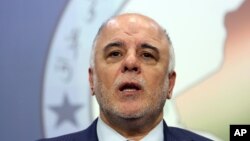The decision Thursday by Iraq's Nouri al-Maliki to give up his post as prime minister leaves the difficult task of leading the nation out of crisis to his designated successor, Haider Jawad al-Abadi.
Former colleague in parliament Abdul-Hadi al-Hassaini described Abadi to the Associated Press as “suave, open-minded, flexible,” and Columbia University scholar Ranj Alaaldin, in an interview with BBC, called Abadi “engaging, articulate and direct.”
Abadi is a political insider who spent much of his life living outside the country.
Born in Baghdad, Abadi worked in Britain as a consultant in the engineering industry until the 2003 U.S.-led invasion of Iraq.
Saddam’s Iraq regime arrested two of his brothers in 1980 for their affiliation with the Dawa party and executed them two years later. In 1981, the regime arrested a third brother for the same reason and jailed him for 10 years.
During his time in London, Abadi was an active leader of Dawa in exile and even ran a café for Iraqi expatriates.
After Saddam’s ouster, Abadi returned home to enter politics. As communications minister, he rebuilt telephone systems destroyed by war and brought in the first mobile and internet contracts.
In 2005, he was elected to parliament and was re-elected in March, 2010. Last year, he chaired the finance committee, tasked with overhauling Iraq’s budget. Most recently, he served as deputy speaker.
Maliki outmaneuvered
Iraq held parliamentary elections in April 2014, in which Maliki’s “State of Law” coalition won an unexpected majority of seats. On July 24, the new parliament selected Fuad Masoum, a Kurd, to serve as Iraq’s new president.
Iraq’s constitution gives the president two weeks to select a prime minister, who must come from parliament’s largest bloc.
Maliki was confident he would serve a third term. But since his last appointment, he has fallen out of political favor, blamed for Iraq’s sectarian divide, rampant corruption and the threat of Islamic militants who have seized the north.
Masoum extended the deadline twice, and on Sunday, an angry Maliki took to the airwaves and threatened to take Masoum to court. The following day, August 11, Masoum named Abadi premier.
Promising step
In recent days, Abadi has pledged to protect all Iraqis and called on them to set aside their differences and unite toward a common vision for the future.
On his Facebook page Tuesday, he promised Maliki would remain a key political partner and he praised his predecessor’s efforts to confront terrorism.
He also announced his intention to “rebuild and re-train” Iraq’s army in order to defeat Islamist militants and promised a "strong and inclusive government and pledged to "fight corruption.”
International leaders have welcomed his nomination. President Barack Obama called the move a “promising step.” Iran's Supreme Leader Ayatollah Ali Khamenei, who formerly backed Maliki, has joined Saudi Arabia, Qatar and Turkey in supporting the nomination.
Abadi has been given 30 days in which to form a new government, necessary for his official confirmation.





